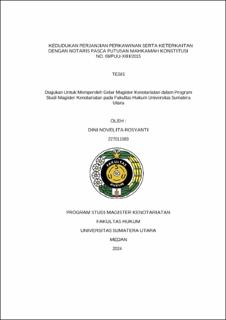| dc.description.abstract | A marriage is an important event which not only unites a man and a woman to live together as a couple of husband and wife, it can cause legal consequences of their joint property. A marriage contract generally regulates a provision about the joint property: their property will be divided when there is separation between them, either because of divorce or death. It also contains anything about their future married life. Nevertheless, the marriage contract has been renewed in the post-issuance of the Constitutional Court Ruling No. 69/PUU-XIII/2015. The research problems are as follows: how about the background of the amendment of Article 29 of Law No. 1/1974 on Marriage by the Constitutional Court, how about the legal consequence of the third party in the post-issuance of the Constitutional Court Ruling No. 69/PUU-XIII/2015, and how about the mechanism of making a marriage contract by a Notary in the post- Issuance of the Constitutional Court Ruling No. 69/PUU-X/2015.
The research uses juridical empirical approach. This research is descriptive analysis and the data are collected by conducting documentary research.
The result of the research shows that the amendment of Article 29 of Law No. 1/1974 on Marriage by the Constitutional Court states that the Petitioner lodges the request for constitutional review to the Constitutional Court regarding Article 21, paragraph (1) and paragraph (2), Article 36, paragraph (1) of UUPA, Article 29, paragraph (1), paragraph (3), paragraph (4), and Article 35, paragraph (1) of Law on Marriage in which, according to basic request of "Marriage Contract", is similar like a "contract" in general: both parties are given freedom (according to legal principle of "freedom to enter into contracts") provided that they are not contrary to legal provisions, morality, or not violates public order. Besides that, the legal consequence of the third party in the issuance of the Constitutional Court Ruling No. 69/PUU-XIII/2015 is that the marriage contract stipulated in the post-issuance of the Constitutional Court Raling is still applicable for both parties (band and wife) who make it. | en_US |


